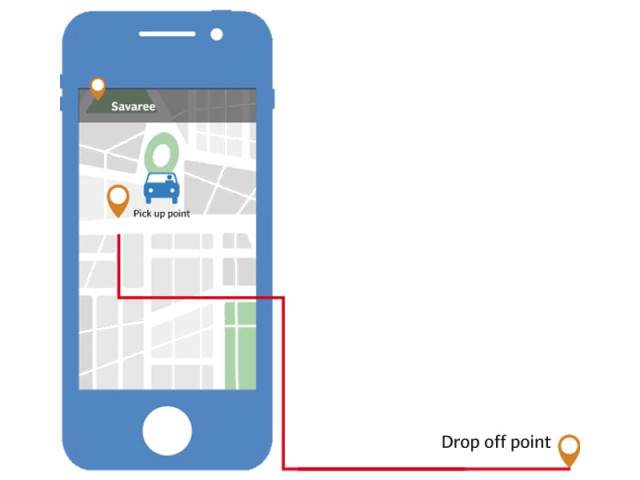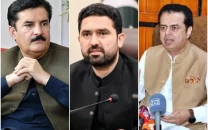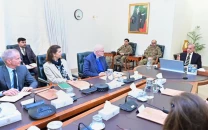Carpool initiative: Up for sharing a savaree?
The mobile phone app offers a platform to those seeking rides with people willing to drive.

The mobile phone app
offers a platform to those seeking rides with people willing to drive.
Her experiences with the unpredictability of public transport in Lahore inspired Madeeha Hassan to look for a solution – a fast and easy way to bring commuters willing to carpool onto one platform. Her brainchild developed into an open source ride-sharing mobile phone application aptly named, Savaree.
The founders of the app say this is the first carpool mobile phone app in the country...it aims to provide drivers and ride-seekers the opportunity to coordinate, share and explore routes to bring potential carpoolers together. The app was launched on Monday.
Hassan, cofounder of the app, said, “As a student and later a professional, I always wanted to know about carpool opportunities and people travelling on the same route...I was always on the lookout for a ride.”
A biotechnology graduate from the Government College University, Lahore, Hassan hails from Rahim Yar Khan. “My commuting experience mostly involved running after rickshaws and juggling commitments when commuting on public transport.” That is how the young biotechnologist-turned-graphic-designer says she had the idea for the app. The idea was first pitched in January at the Lahore Civic Hackathon – organised by Code for Pakistan – the feedback the founders received there encouraged them to pursue the idea. “Our app was awarded the audience favourite...that was really encouraging,” Hassan said.
She said a pre-development market survey of 1,000 people, indicated that almost 95 per cent of the respondents wanted such a service. “One of the major reasons mentioned was the unreliability of public transport,” she said.
It took almost two and a half months for Zuhaira Farooq and Faisal Basra, the developers, and their marketing teammate Ahmad Jabbar to develop the app.
Once downloaded, the app asks if the user is a driver or a passenger followed by a series of queries seeking information regarding the route they want to travel, their pick-up and drop-off points and the vehicle number plate and model. Once a profile is created and the route selected, the app offers the users some suggestions and after a mutual agreement, the user is set to carpool. But the developers have identified one important challenge – security. “We require all our users to enter their national ID card details on the app,” Hassan said. The team hopes to partner with the NADRA to create a verification system for users. The users also have an option of selecting a public or a private ride. “We understand that most people will not give strangers a ride, or ride with strangers...this is why we have offered ride options.” For those who want a private ride, the app works on connections and offers users a list of carpoolers from the same organisation or educational institution.
“Carpooling isn’t very popular in Pakistan, mostly because most of us live in fear and suspicion,” Qasim Zafar, Savaree co-founder, said. Zafar, a senior year student of electrical engineering at the Lahore University of Management Sciences, teamed up with Hassan during the hackathon. “But carpooling with a colleague or a classmate at the university puts a lot of fears to rest.” This is what the team aspires to cash on – organisation-based potential carpoolers.
Zafar said that the app also proposed a fare for each ride depending on the route, distance travelled and the number of riders. He said the idea would work based on an agreement between the carpoolers. While sharing a ride on a motorcycle is fairly common, Zafar said that wasn’t the case with cars.
For now, the team is targeting students at the LUMS. They hope to take the app to other universities in a week and later to business organisations.
Zafar said they were looking into developing additional features including GPS tracking and community-based feedback of drivers. “This will help us make carpooling safe and reliable for our users,” he said.
Zafar said that security concerns, social trends and “elitist attitudes” were discouraging elements where carpooling was concerned. “We understand that these issues will pose challenges regardless of how hard we try but feedback is important to us and can help us overcome these challenges.”
The app is available on Google Play Store for free.
Published in The Express Tribune, April 18th, 2014.



















COMMENTS
Comments are moderated and generally will be posted if they are on-topic and not abusive.
For more information, please see our Comments FAQ